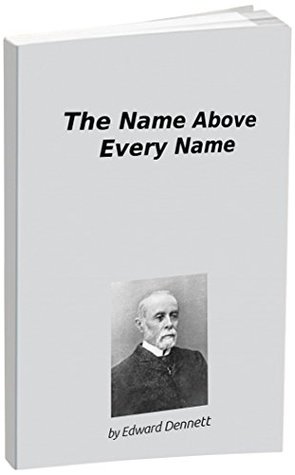- Bíblia
- Leia a Bíblia
- Versões da Bíblia
- Verso do dia
- Planos de Leitura
- Versos por Tópico
- Books of the Bible
- Imagens bíblicas
- Estude
- Comentários
- Concordâncias
- Dicionários
- Enciclopédias
- Sermões
- Bible Atlas & Maps
- BP Wiki
- Devocionais
- Devocionais de hoje
- Light of the World
- Todos os devocionais
- Inspirational Quotes
- Mais
- Picture Quotes
- Videos
- Inspirador
- Estudo da Bíblia
- O que a Bíblia diz
- Bible Q&As
- Daily Bread
- Bible by Genre
- Bible Stories
- Random Bible Verse
- Comunidade
- Store
The Name Above Every Name
by Edward Dennett
THE following chapters, which first appeared in The Christian Friend and Instructor, are now collected and printed in a separate form. They all relate to the revelation which God has been pleased to make of Himself, first in the successive eras of the Old Testament, and finally in the Incarnation, Death, Resurrection, and Exaltation of our blessed Lord and Saviour. In the fervent hope that their perusal may be used in the Lord's goodness to lead the reader into a growing acquaintance and intimacy with Himself, they are commended to Him for His blessing.
Chapter 1 The Ineffable Name
Chapter 2 "Thou shalt call his name Jesus"
Chapter 3 "They shall call his name Emmanuel"
Chapter 4 "Thy Name is as ointment poured forth"
Chapter 5 The Name which is above every name
Chapter 6 "At the Name of Jesus"
Chapter 7 "In his Name"
Chapter 8 "For his Name's Sake"
Chapter 9 "Unto his Name"
Chapter 10 Revelation 19:12, 13
Chapter 11 "His Name shall be in their foreheads"
Chapter 12 "Thou remainest"
Chapter 1 The Ineffable Name
Chapter 2 "Thou shalt call his name Jesus"
Chapter 3 "They shall call his name Emmanuel"
Chapter 4 "Thy Name is as ointment poured forth"
Chapter 5 The Name which is above every name
Chapter 6 "At the Name of Jesus"
Chapter 7 "In his Name"
Chapter 8 "For his Name's Sake"
Chapter 9 "Unto his Name"
Chapter 10 Revelation 19:12, 13
Chapter 11 "His Name shall be in their foreheads"
Chapter 12 "Thou remainest"
BUY NOW
Kindle Edition, 64 pages
Published February 16th 2015
Se inscrever
© 2025 Bibleportal.com Todos os direitos reservados.

Edward Dennett was born in the Isle of Wight, at Bembridge, and died in Croydon after a short illness. His people were all in the Church of England, but he was converted as a lad through the instrumentality of a godly clergyman, and he left the church from conviction and became minister of a Baptist Chapel in Greenwich, having previously matriculated at London University.
In 1873 he contracted a severe illness through visiting one of his parishioners, and was sent abroad for a year by his people. He wintered at Veytaux, and coming in contact with 'brethren' staying at the same 'pension', he had a good deal of intercourse with them, which helped to clear in his mind certain difficulties that he had.
Taking no steps till his return, he explained his views and resigned his charge. Shortly after 'breaking bread' for the first time with those gathered simply at the Lord's table "unto His Name".
Mr. Dennett had the pen of a ready writer. His sphere of labour was England, Ireland, and Scotland, and he paid visits to Norway, Sweden, and America. He had pastoral and teaching gifts of a high order.
... Show more